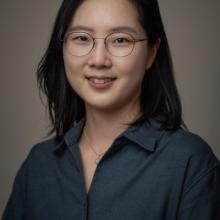Juri Kim
Why did you decide to pursue a graduate degree?
Growing up in South Korea, I occasionally experienced the impact of heavy rainfall and typhoons during the summer rainy season. One event that had a profound impact on me was the massive typhoon Maemi in 2003 which left a lasting impression on me, as I witnessed the destruction of human livelihoods and the devastating consequences of natural hazards. This experience ignited a strong interest in finding effective ways to reduce such damages. During my undergraduate years at UNIST, where I majored in disaster management engineering, I had the chance to participate in several research internships. These experiences allowed me to engage in academic discussions on how to effectively mitigate disaster damages and solidified my desire to pursue a career in research. Continuing my academic journey at Seoul National University for my master's program, I focused extensively on reducing vulnerability and enhancing resilience to floods. A turning point in my passion for disaster recovery came when I participated as an observer in COP23 in 2017, where I became acutely aware of the implications of climate change, leading to more intense and frequent disasters in the future. This experience further deepened my commitment to researching ways to enhance post-disaster recovery processes and increase community resilience. Motivated by these impactful experiences, I made the decision to pursue a doctoral program that would allow me to conduct research directly related to post-disaster recovery.
Why did you decide to study at UBC?
My decision to study at UBC was influenced by two compelling factors. Firstly, UBC's outstanding reputation for research excellence and world-class education, particularly in the field of Planning, drew me in as I sought a graduate program that could provide the best resources for my academic pursuits. Secondly, the research opportunity with a leading disaster researcher, like my current advisor, Dr. Stephanie Chang, greatly appealed to me. At the time of my application, she was seeking a student to focus on disaster recovery research, and engaging in conversations with her solidified my decision to apply. Deciding to attend UBC has been one of the most rewarding choices in my academic career, as my advisor and the university have provided me with exceptional education and research opportunities to collaborate with leading researchers.
What is it specifically, that your program offers, that attracted you?
What specifically attracted me to UBC's School of Community and Regional Planning was the presence of highly specialized faculty whose research interests aligned with my own. Moreover, the availability of funding opportunities for graduate students allowed me to pursue my academic goals without bearing the financial burden of studying abroad. After enrolling in the program, I was also delighted to discover the School's supportive and inclusive atmosphere that fosters an environment where students from diverse backgrounds could collaborate, exchange ideas, and learn from one another.
What was the best surprise about UBC or life in Vancouver?
I found my experience at UBC to be pleasantly surprising in many aspects. One of the highlights was the university's commitment to supporting graduate students' growth as researchers through fellowship opportunities and various workshops. For example, I recently had the privilege of participating in numerous research seminars and engaging with fellow graduate students as an IAR fellow from the School of Public Policy and Global Affairs. I was also able to learn valuable skills through UBC workshops and seminars. These abundant resources enriched my academic journey and contributed significantly to my professional development. Beyond the academic opportunities, Vancouver's stunning surroundings, with its beautiful campus, rainforests, oceans, and mountains, provided great opportunities for outdoor adventures.
What aspects of your life or career before now have best prepared you for your UBC graduate program?
I believe that the research experiences I had during both my undergraduate and master's studies have played a vital role in preparing me for my doctoral program. Through these diverse experiences in fields that intrigue me, I have gained valuable insights into the specific topics I want to explore further.
What advice do you have for new graduate students?
Unexpected situations can occur during the graduate program that may cause disruptions and stress. I hope you won't be overly burdened by circumstances that are often beyond our control. During the early stages of my doctoral program, I, like many other graduate students, faced numerous unforeseen challenges brought about by the COVID-19 pandemic. However, I also discovered opportunities for personal and academic growth during this time. In moments like these, I want to encourage you to stay committed to your goals while maintaining a balance between work and personal well-being.
